From the flat grasslands and plains to the rugged tundra and boreal forests, to the soaring mountains and glaciers and finally, to the roaring Pacific Ocean, Canada’s National Parks showcase outstanding examples of beautiful landscapes.

Daily admission fees are charged at most national parks to support facilities, visitor programs, services and conservation.
While the idea of a daily fee seems like an easy concept, there are some unexpected complexities that can leave some national park visitors scratching their heads.
The price for a pass varies between parks, for example. Some parks charge less during certain seasons.
And then there is the Discovery Pass. Should you buy one of them or is paying the daily fee still cheaper? And what about parks that don’t charge at all?
And just when you think you’ve got it all figured out, you discover that national park and provincial park fees are not the same thing.
I had all these questions and concerns when I moved to Canada in 2011. Now, after visiting 18 different national parks across the country, I now feel a lot more confident navigating the system.
Read on to learn everything you need to know about Canada’s National Park admission fees. It’s sure to help you plan your next National Park adventure!
Here’s what to expect:
- What exactly is a National Park in Canada?
- Where are Canada’s National Parks?
- National Park fees in Canada
- Discovery Passes (Parks Canada’s annual pass)
- Other National Park pass options
- Canada’s provincial parks
- National Park admission FAQ

What exactly is a National Park in Canada?
Before we go any further, I’ll explain more about Canada’s national park system.
Canada’s National Parks
Canada’s National Park system legally protects and preserves 336,343 square kilometres of land, specifically areas that are representative of Canada’s natural landscapes.
Parks Canada is the Canadian government agency in charge of managing the National Park system.
While public enjoyment and appreciation of the park system is encouraged, Parks Canada works to ensure that visitation does not risk ecological integrity.
Some National Parks are small (22 sq km, Prince Edward Island) while others are much, much larger (44,807 sq km, Wood Buffalo).
Most National Parks typically have viewpoints, camping opportunities, hiking trails, lake access, visitor centers and other facilities. Some of Canada’s National Parks are exceptionally remote and have few visitor services.
The oldest National Park in Canada is Banff in Alberta, founded in 1885.
Canada’s national parks are located on land that many First Nations, Métis and Inuit have cared for and lived on since time immemorial.
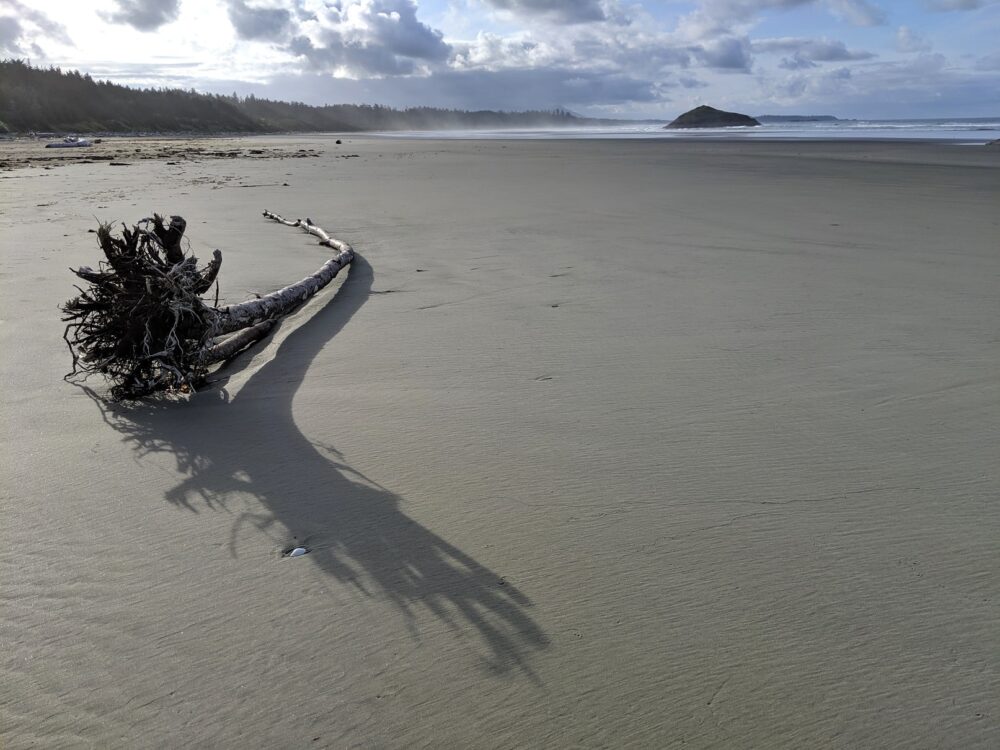
National Park Reserves
National Park Reserves are protected and managed in a similar way to National Parks but are currently undergoing a process of Indigenous land claim negotiation.
Think of National Park Reserves as proposed national parks. The boundaries and conditions will be determined in agreement with local Indigenous people, who may continue to use the land for traditional food gathering (fishing, trapping, hunting) and spiritual activities.
There are proposed National Park Reserves too, with one being very local to JR and I – the potential South Okanagan-Similkameen National Park Reserve.
Parks Canada intends to have a system of national parks that represent each of Canada’s natural regions. The Canadian government aims to protect biodiversity through the conservation of 30% of land, with the target of 10 new national parks by 2030.
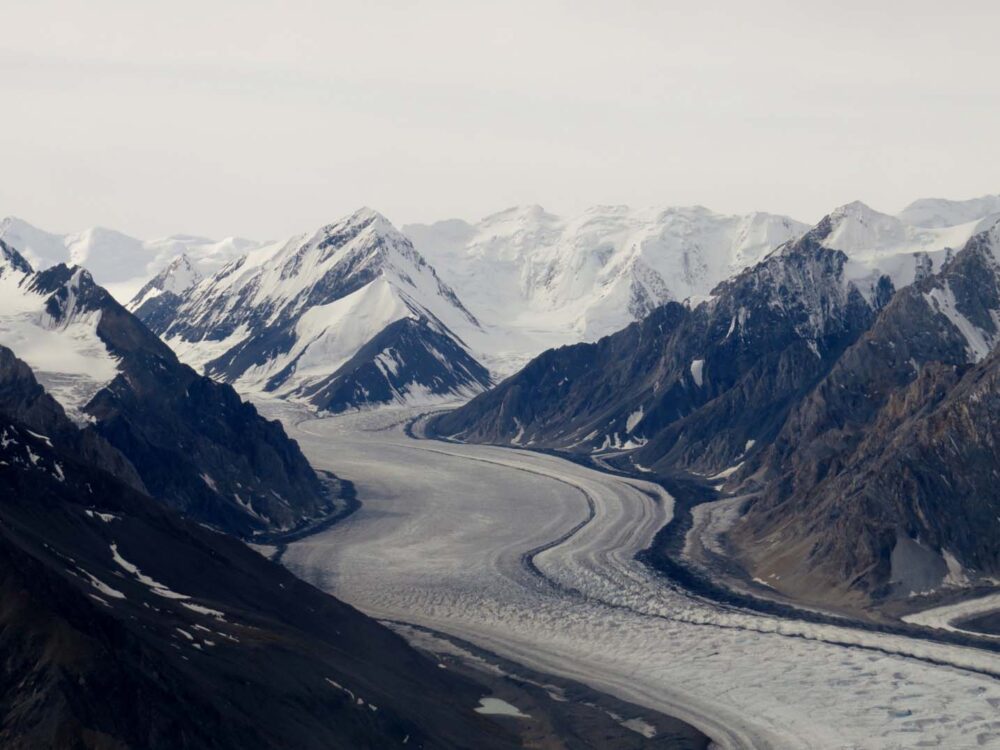
National Historic Sites
1004 National Historic Sites are situated across Canada. Parks Canada manages around 17% of them.
National Historic Sites are places of profound importance to Canada’s history. These commemorate places and events that have shaped the identity of Canada.
Found in every territory and province, National Historic Sites are located in both urban and rural environments. They include sacred Indigenous sites, heritage houses, battlefields and places of scientific discovery.
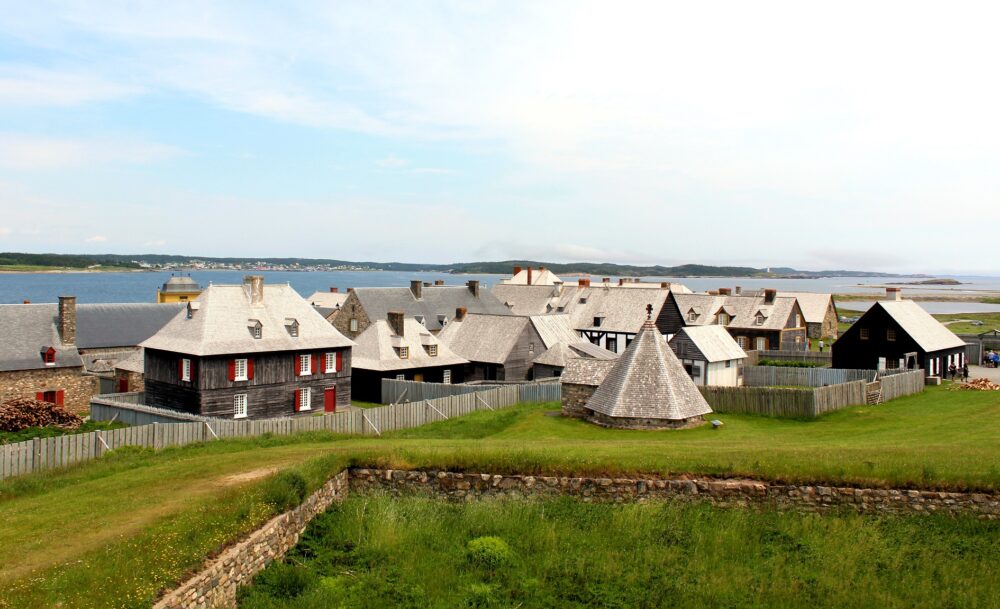
National Marine Conservation Areas
There are a small number of National Marine Conservation Areas that are managed for sustainable use by Parks Canada.
One of the best examples is Saguenay–St. Lawrence Marine Park in Quebec, known as one of the best places for whale watching in the entire world. We spotted beluga whales and minke whales right from shore here.
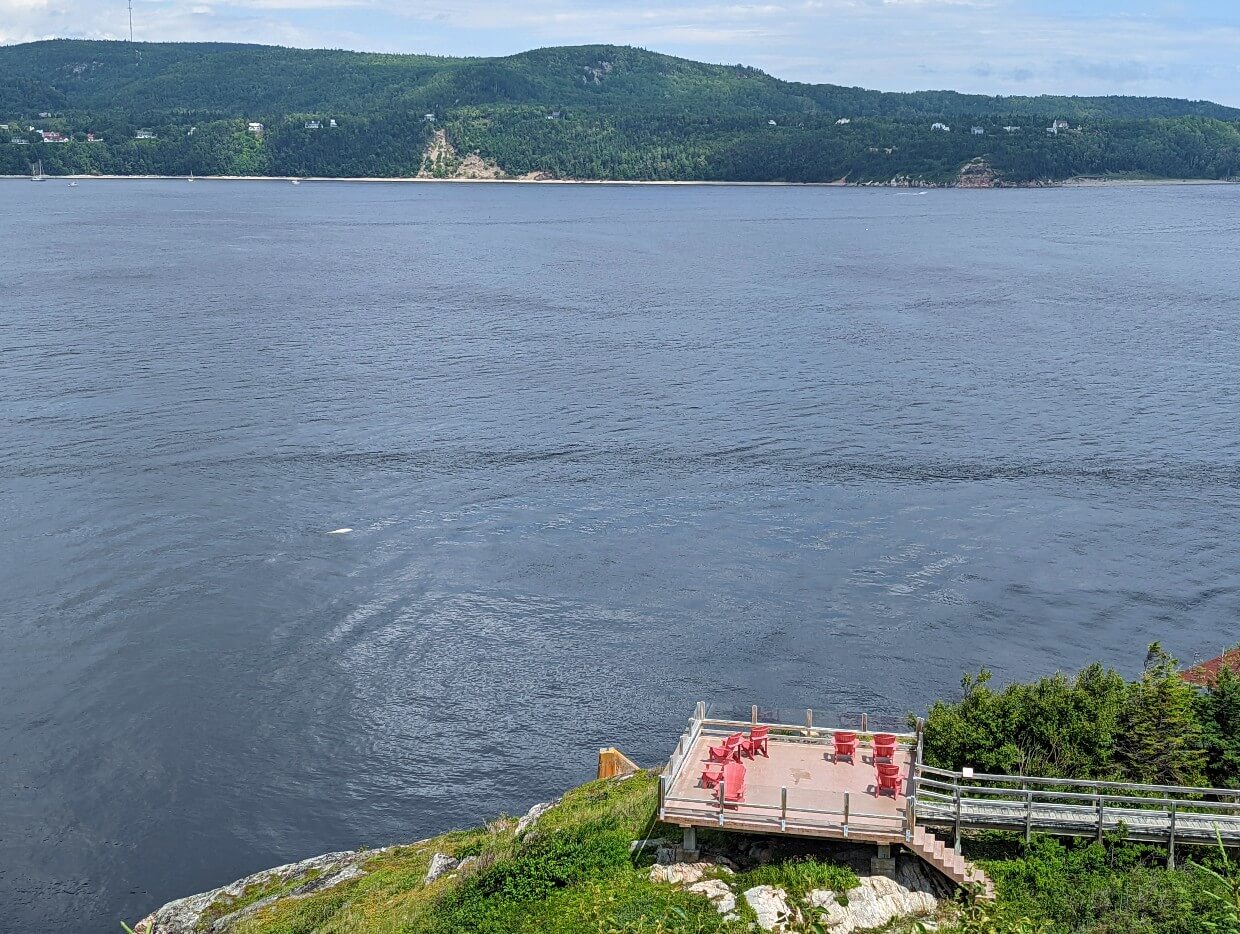
Where are Canada’s National Parks and National Historic Sites?
There are currently 37 National Parks and 10 National Park Reserves found across Canada, with at least one Park in each province and territory.
National Historic Sites are also located across the country.
The Parks Canada website lists all of the National Parks and National Park Reserves and National Marine Conservation Areas plus the 171 National Historic Sites that they currently manage.
Some of Canada’s best known National Parks are:
- Pacific Rim National Reserve, British Columbia – Long sandy beaches backdropped by temperate rainforest on Canada’s western edge
- Kluane National Park and Reserve, Yukon – Host to Canada’s highest mountains including Mount Logan (5959m)
- Banff National Park, Alberta – Huge snow-capped peaks and turquoise glacial lakes in the heart of the Canadian Rockies
- Jasper National Park, Alberta – Home to the largest icefield in the Canadian Rockies and iconic Spirit Island view
- Bruce Peninsula National Park, Ontario – Towering cliffs above the colourful waters of Georgian Bay
- Cape Breton Highlands National Park, Nova Scotia – Drive the legendary Cabot Trail and see where mountains meet the ocean
- Gros Morne National Park, Newfoundland – Glacier-carved freshwater fjords accompanied by mountains, waterfalls and beaches

National Park fees in Canada
Canada’s National Parks are funded by government contributions and user fee revenues. The latter supports visitor services and facilities.
To visit most of Canada’s National Parks, Reserves, Marine Conservation Areas and National Historic Sites, an admission fee is charged on a daily basis.
This means that visitors must pay a per person admission fee for each day they spend within park boundaries.
Upon payment of the admission fee, a park pass is issued. A park pass is also known as a day-use permit.
As mentioned, park pass fees help pay for park facilities and services including day-use areas, trail maintenance, public safety, education and visitor centres.
National Park admission fees
National Park admission fees vary between parks. S
Some parks have a seasonal fee structure, with cheaper rates in winter and/or the shoulder seasons. A few parks offer half-day passes.
Admission fees are charged as per the age of the visitor and/or the size of the group.
- Adult – 18 to 64 years of age
- Senior – 65 years of age or over
- Family/Group – Up to seven people arriving in a single vehicle
All children and youth (17 years old and younger) receive free admission.
Park fees are listed on this Parks Canada search page.
2025 admission fee examples:
Banff National Park, Alberta (year-round)
| Adult | $11.00 |
| Senior | $9.50 |
| Youth | free |
| Family/Group | $22.00 |
| Commercial Group, per person | $9.35 |
Please note that daily passes for the Canadian Rockies area parks (Banff, Jasper, Kootenay, Yoho, Mount Revelstoke, Glacier, Waterton Lakes and Elk Island) provide entry into all parks in this region until 4pm the next day.
Pukaskwa National Park, Ontario (May to November pricing)
| Adult | $6.50 |
| Senior | $5.50 |
| Youth | free |
| Family/Group | $13.50 |
| Commercial Group, per person | $5.53 |
Forillon National Park, Quebec (late June to early September)
| Adult | $9.00 |
| Senior | $7.75 |
| Youth | free |
| Family/Group | $17.50 |
| Commercial Group, per person | $7.65 |
Some national parks do not charge admission fees, such as Kluane National Park and Reserve in Yukon Territory.
Rouge National Urban Park is a free admission park, though payment is required for parking at the Zoo Road Day Use Area.
National Historic Site admission fees
National Historic Site admission fees vary between specific sites.
Some Historic Sites have different seasonal pricing as well, with higher pricing during the summer peak season.
2025 admission fee examples:
Cave and Basin National Historic Site, Alberta (year-round)
| Adult | $9.00 |
| Senior | $7.50 |
| Youth | free |
| Commercial Group, per person | $7.65 |
Fortress of Louisbourg National Historic Site, Nova Scotia (July to September)
| Adult | $19.75 |
| Senior | $16.75 |
| Youth | free |
| Commercial Group, per person | $16.79 |
Not all Historic Sites charge an admission fee. Ford Edward National Historic Site in Nova Scotia, for example, is completely free to visit.
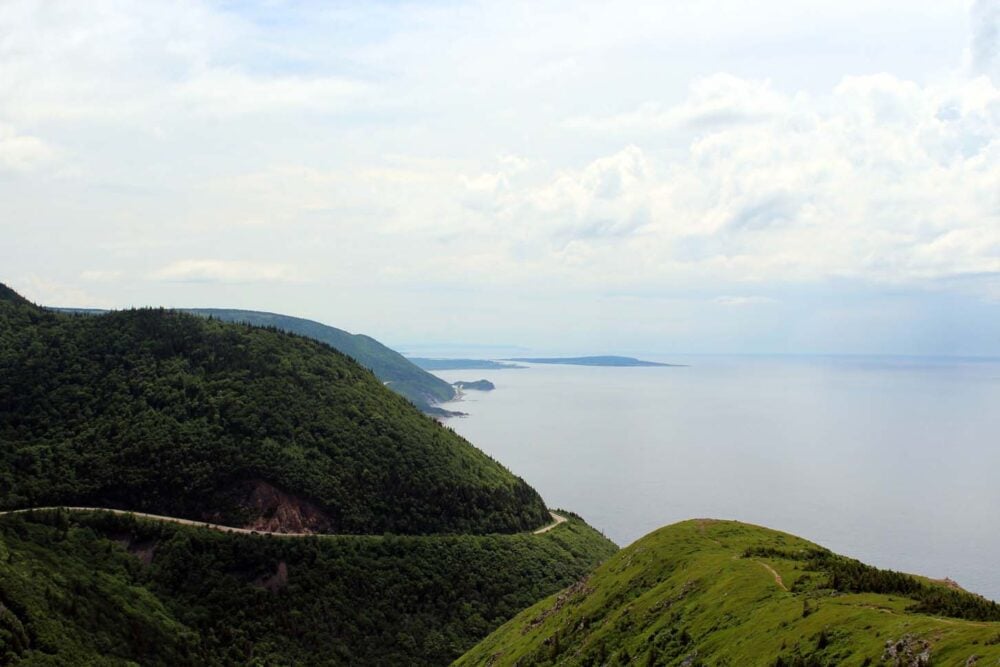
Other fees
The daily admission fee to Canada’s National Parks and National Historic Sites is for entry only.
Extra fees apply for:
- Any kind of camping, whether in the front country (car camping) or backcountry (accessible via foot or boat)
- Firewood at campgrounds
- Campsite reservations (mandatory for backcountry adventures)
- Access to hot springs pools managed by Parks Canada, such as Radium Hot Springs
- Some guided tours/hikes and interpretive programs
- Moraine Lake/Lake Louise shuttle in Banff National Park
- Additional parking fees in some parks (Bruce Peninsula, Rouge)
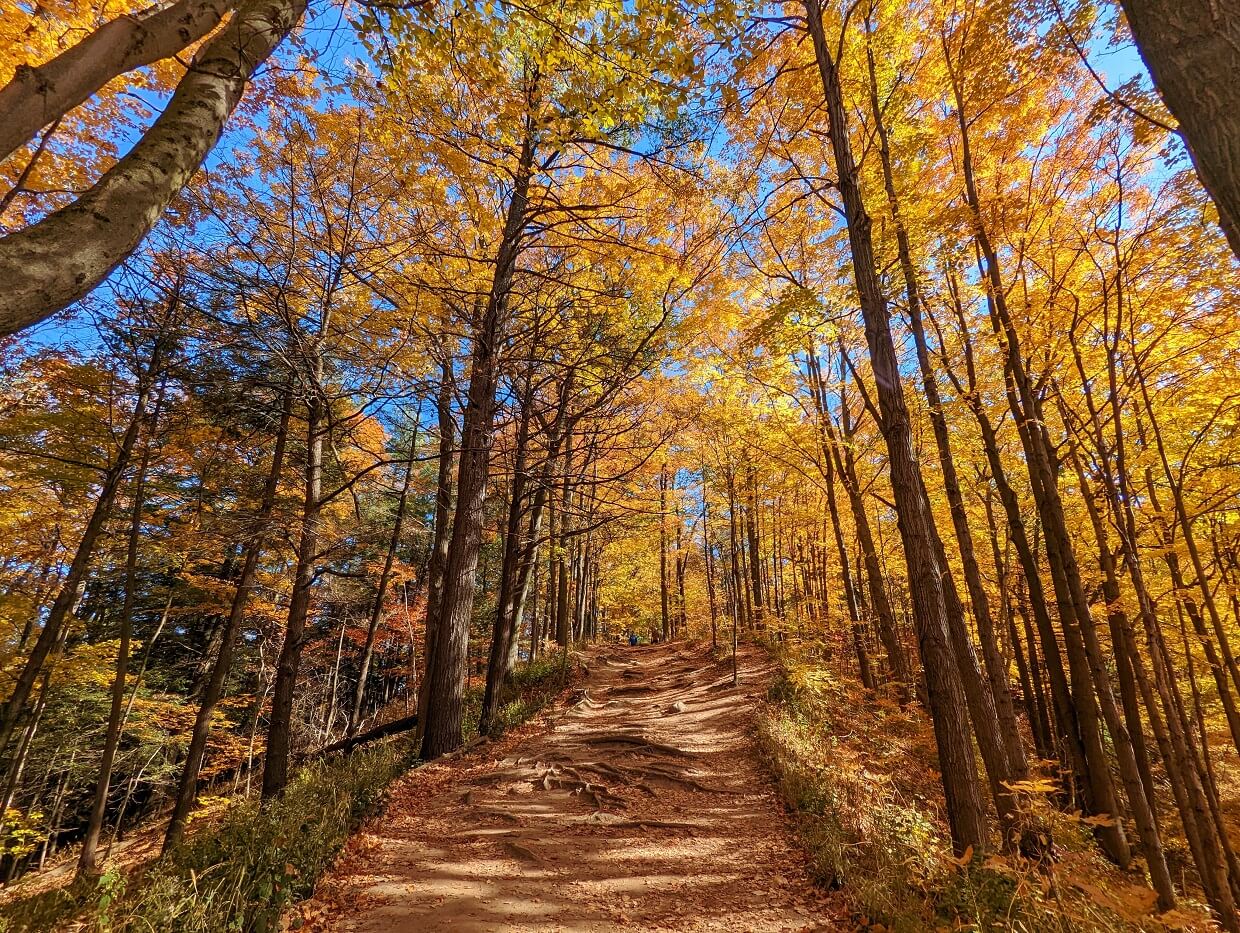
How to pay National Park fees in Canada
The admission fee payment process varies between national parks.
Park passes are available for purchase at Visitor Information Centers and staffed campgrounds. Some parks also have pass machines in parking areas.
In remote areas, park passes can sometimes be purchased at local businesses. This is the case for Gros Morne National Park in Newfoundland.
The busiest national parks have roadside booths at the entrance gate(s), where you can purchase a pass without leaving your vehicle. Cash, debit and credit cards are accepted and it is possible to pay for multiple days at a time.
This is true for Banff National Park. All drivers driving west into the park on Highway 1 must pass through a booth area. There is a lane for through traffic and visitors who already have passes.
From personal experience, the following other parks operate a booth system:
- Jasper National Park, Alberta
- Mount Revelstoke National Park, British Columbia (Meadows in the Sky Parkway)
- Kootenay National Park, British Columbia (Radium entrance)
- Bruce Peninsula National Park, Ontario (Cyprus Lake Road)
- Fundy National Park, New Brunswick
- Kouchibouguac National Park, New Brunswick
- Cape Breton Highlands National Park, Nova Scotia
- Kejimkujik National Park and National Historic Site, Nova Scotia
The entrance booths usually only operate during regular office hours. After this time, drop by a Visitor Information Center or staffed campground.
For Banff and Jasper, it is also possible to buy daily park passes online via the Banff and Lake Louise Tourism and Tourism Jasper websites. Passes must be printed and displayed to be valid.

Discovery Passes (Parks Canada’s annual pass)
The Discovery Pass is a pass that provides free entry to all National Parks/Reserves, Marine Conservation Areas and Parks Canada-run National Historic Sites.
A Discovery Pass can pay for itself in as little as seven days of national park visitation (compared to daily admission fees).
Another bonus of Discovery Passes is faster entry into national parks.
At road entrances into Banff National Park, for example, there is no need to stop at the Parks Canada gatehouse if you have a valid Discovery Pass displayed.
Discovery Pass 2025 prices
Parks Canada Discovery Pass prices in 2025:
Adult $75.25
Senior $64.50
Family/Group $151.25
Discovery Passes are valid for 12 full months from the date of purchase.
Each pass must be signed by the pass holder, who has to be present when the pass is used.
The Family pass includes up to 7 adults in the vehicle. It doesn’t have to be the same group of people accompanying the pass holder each time.
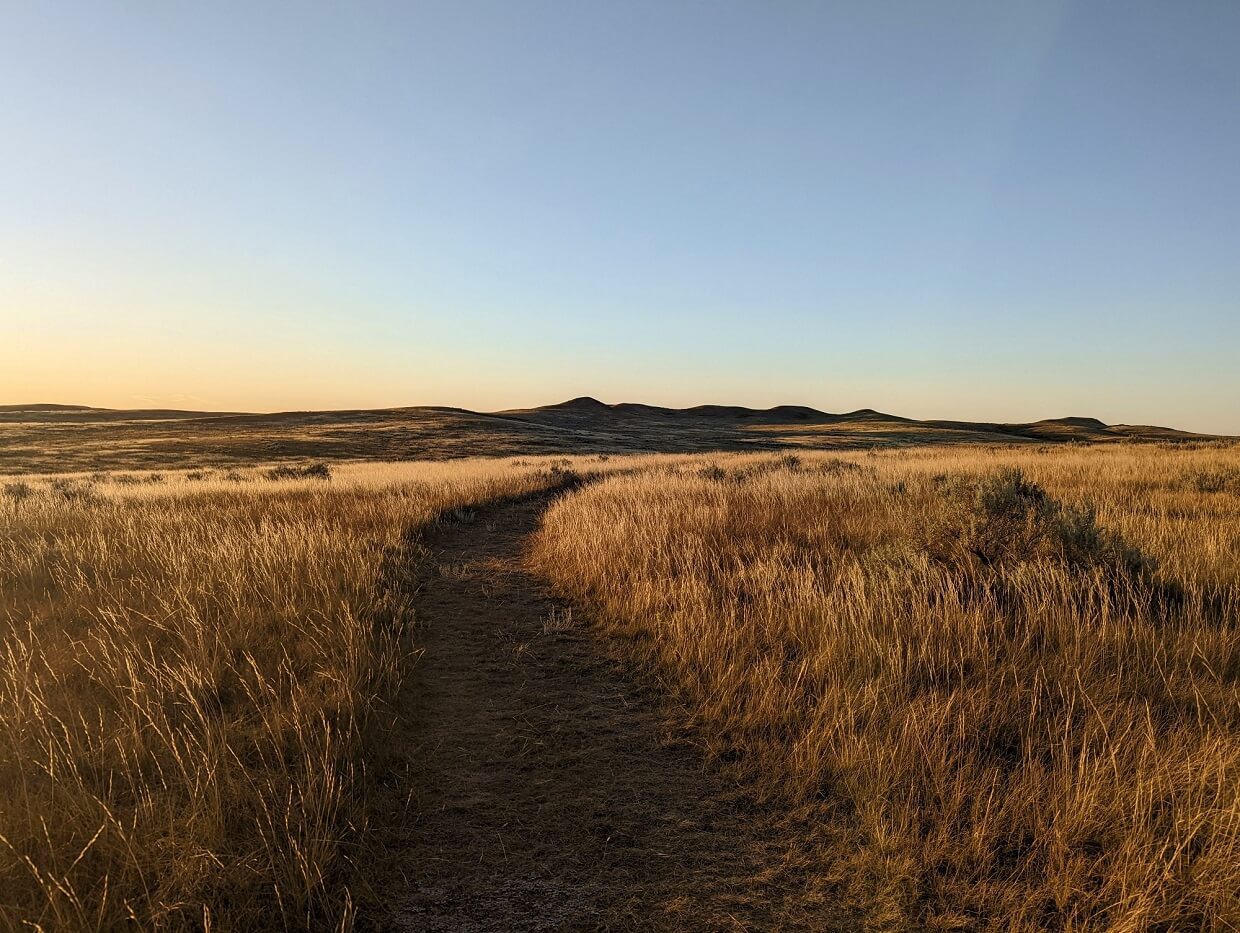
Is it worth getting a Discovery Pass?
If you’re planning to explore Canada’s national parks for seven days or more in the same year, a Discovery Pass will usually save you money.
If you are a group of multiple adults, a Discovery Pass will save you money even more quickly!
With daily admission currently $11.00/adult for the Rocky Mountain parks (Banff, Jasper, Yoho, Kootenay, Mount Revelstoke, Glacier), it’s easy to see how a Discovery Pass can be a huge money saver when travelling this region of Canada.
The Discovery Pass also offers free entry into the Cave and Basin National Historic Site ($9.00/adult) and the Banff Park Museum National Historic Site ($4.50/adult).
Travelling to Canada’s East Coast and love history and heritage? There are so many National Historic Sites in this area, with entry fees ranging from $4.50 to $19.75 per adult (the latter being the amazing Fortress of Louisbourg National Historic Site).
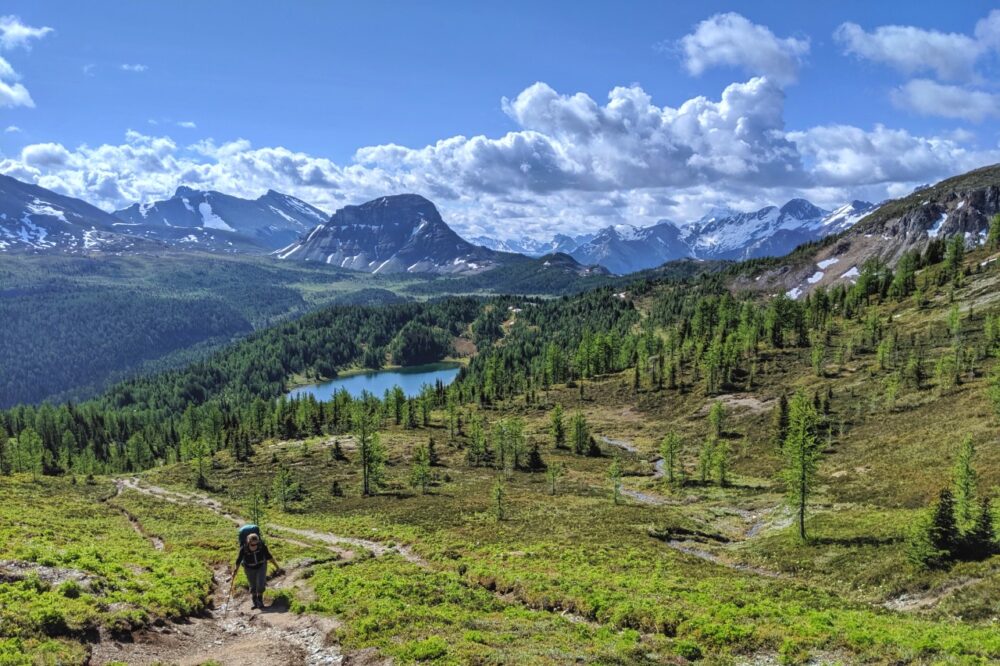
How to buy a Discovery Pass
Discovery Passes can be purchased on the Parks Canada website or in person, at various Parks Canada locations (entrance gates, Visitor Centers, some staffed campgrounds).
It is also possible to purchase Discovery Passes via the MEC website and at select retail locations across Canada.
Banff and Lake Louise Tourism also offer online Discovery Pass purchases.
If you buy the pass online, allow plenty of time for it to arrive before your intended trip. If you’re visiting Canada from outside North America, I would suggest waiting to buy the pass in person.

Other National Park pass options
Another money-saving option is to buy single location (annual) park pass. These allow unlimited entry to a single national park.
This is a great idea if you live near a national park/historic site or have a trip planned that involves extensive travel in one park only.
Though not available for all of Canada’s national parks and historic sites, there are single-location passes for many of the most popular destinations.
Examples include Pacific Rim on Vancouver Island (BC), Waterton Lakes (Alberta) and Fundy National Park (New Brunswick).
Some single-location passes can be purchased on the Parks Canada website, but most are obtainable in person only.
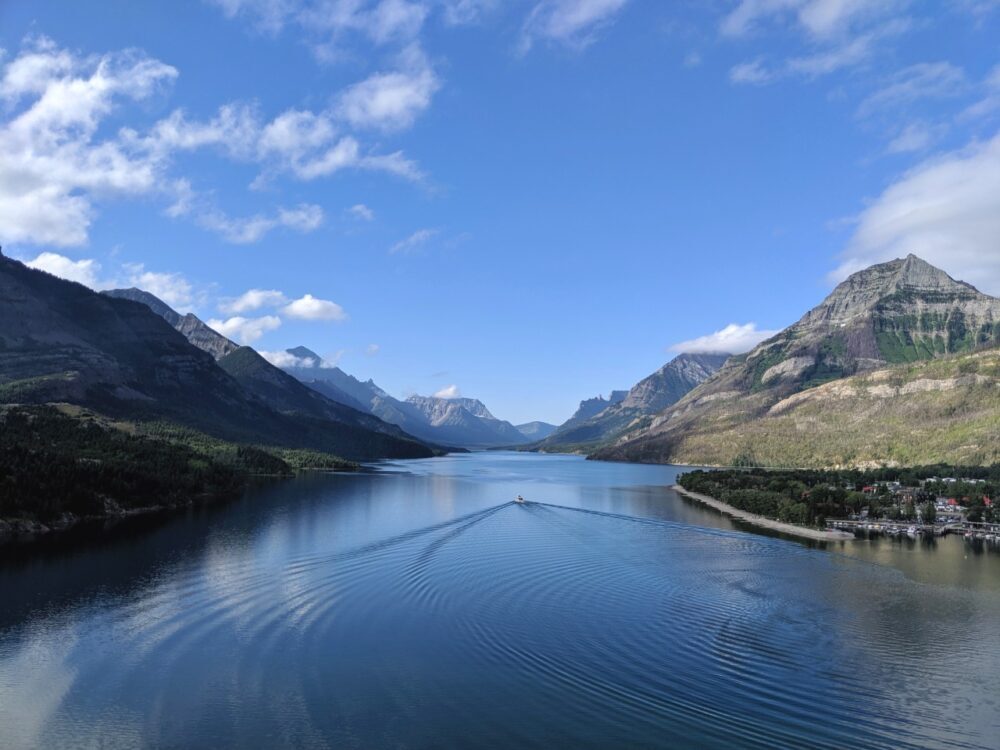
Canada’s Provincial Parks
Canada is divided into ten provinces and three territories.
Each province and territory has its own provincial and territorial park system. These are also protected areas, but they are administrated by the individual governments of provinces and territories (not the federal government).
There are many more Provincial and Territorial Parks than there are National Parks. British Columbia, for example, has over 600 Provincial Parks!
In some provinces, entry to Provincial Parks is free. In other provinces, there is a daily fee much like Canada’s National Parks.
Please note that the provincial/territory park fee system is completely different from those issued by Parks Canada for National Parks. In other words, provincial/territorial park passes are not interchangeable with National Park passes.
When researching your trip to Canada, be careful to check whether a protected area is part of the provincial/territorial system or the National Park system.
This is particularly important in Quebec, where provincial parks are referred to as ‘national parks.’ Quebec’s provincial parks are administered by Sépaq, rather than Parks Canada.
Just to add confusion, keep in mind that there are municipal parks and regional parks as well. The vast majority of these are free to enter.
Provincial/territorial park fee systems
- British Columbia: Free day use
- Yukon: Free day use
- Northwest Territories: Daily vehicle fee
- Alberta: Free day use*
- Saskatchewan: Daily vehicle fee
- Manitoba: Daily vehicle fee (waived in 2025!)
- Ontario: Daily vehicle fee
- Quebec: Per person daily fee
- New Brunswick: Per person daily fee
- Prince Edward Island: Free day use
- Nova Scotia: Free day use
- Newfoundland: Daily vehicle fee
- Nunavut: Free day use
*Except Kananaskis Country and the Bow Valley Corridor, which require a Conservation Pass (daily fee)

National Park admission FAQ
Yes. Campground guests are not exempt from the daily admission fee in national parks (unlike in some of Canada’s provincial parks).
The Parks Canada website has a handy search function just for fees.
Yes, if you don’t plan to stop anywhere along the way. Obviously, I would imagine that an exemption would be made for emergency situations (e.g. vehicle breakdown). More details below.
It depends.
In the case of a main highway route traversing a National Park, you are allowed to drive the highway without paying the admission fee as long as you don’t stop and use any park services (parking lots, hiking trails etc.)
Examples would be Highway 4 through Pacific Rim National Reserve (BC), Highway 114 through Fundy National Park (New Brunswick) and Highway 30 through Cape Breton National Park (Nova Scotia).
There are two major exceptions to this rule, both in the Canadian Rockies.
Highway 93 (the Icefields Parkway between Lake Louise and Jasper) and Highway 1A (between Banff and Lake Louise) are considered scenic parkways and a valid park pass is required to drive them.
But what about other park roads, you ask? Roads that are not considered through routes also require a pass.
For example, the core area of Kejimkujik National Park and National Historic Site (Nova Scotia) is accessed via Highway 8. There is no other highway entrance or exit. The only reason to enter the park boundaries is to visit the park itself, so a park pass is required.
No, you don’t have to be related to receive the family/group vehicle rate for entry into Canada’s national parks.
By law, all visitors to Canada’s national parks must purchase a national park entry pass and display it on their vehicle.
Park Wardens enforce park regulations as required by the Canada National Parks Act. Violators risk being issued a fine.
We have personally had our pass checked many times. In one instance, the warden could not see our pass and therefore left us a warning notice (our van does not have a rearview mirror so we have to leave our Discovery pass on the dashboard instead).
The notice stated that we needed to physically show a valid park pass to Parks Canada staff ASAP or be fined. Luckily, the warden was still close by when we returned to our vehicle so we were able to show them the pass right there and then.
Park passes should be displayed prominently on the dash of your vehicle.
Discovery Passes should be hung on the rearview mirror where possible. If your vehicle doesn’t have a rearview mirror (our van does not), display the pass prominently on the dashboard as above.
The pass holder must be present when using the pass. A Discovery Pass should be signed by the pass holder. It is void when re-sold or transferred. If you haven’t signed it after receiving it, you’ll be prompted to do so when you first use it at a National Historic Site.
National parks and provincial parks are separate systems. Parks Canada administers Canada’s national parks while provincial parks are managed by individual provincial governments. See provincial parks section for more information.
Yes! Park passes for parks in the Rocky Mountains region (Banff, Jasper, Kootenay, Yoho, Mount Revelstoke, Glacier, Waterton Lakes and Elk Island) can be used interchangeably. Daily passes are valid until 4pm the next day.
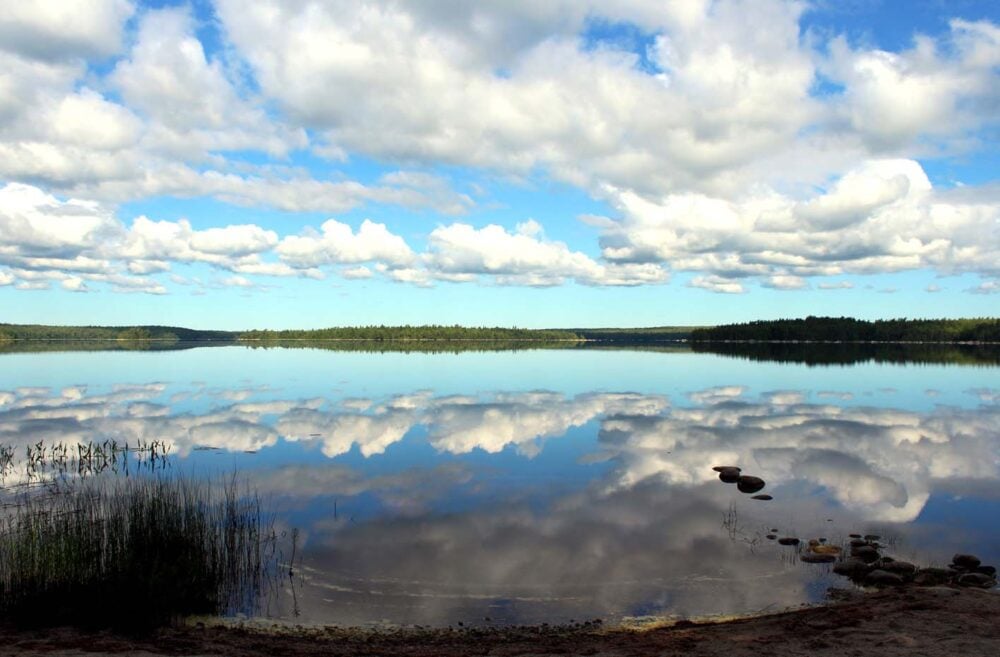
Check out these amazing Parks Canada destinations next:
Maligne Lake, Jasper National Park, Alberta
Lake O’Hara, Yoho National Park, British Columbia
Burgess Shale, Yoho National Park, British Columbia
Eva Lake, Mount Revelstoke National Park, British Columbia
Kejimkujik National Park, Nova Scotia
Mount Logan, Kluane National Park, Yukon
Mount Norquay Via Ferrata, Banff National Park, Alberta
Check out these recently published posts:

One half of the Canadian/British couple behind Off Track Travel, Gemma is happiest when hiking on the trail or planning the next big travel adventure. JR and Gemma are currently based in the beautiful Okanagan Valley, British Columbia, Canada. Consider buying us a coffee if you have find any of our guides helpful!

![How to Visit Lake O’Hara Without a Reservation [Road Walk, Return Bus, Cancellations]](https://offtracktravel.ca/wp-content/uploads/2025/06/header-lake-ohara-without-a-reservation-400x500.jpg)


I have been told that you must make reservations a year in advance to camp in Canada parks. We planned a 2 month RV trip through eastern Canada from mid-August to mid-Oct. but have not made any reservations. Is this really necessary or highly recommended vs. taking our chances?
Campsites in Canada’s National Parks are in high demand, especially in summer. For your trip, I would make reservations in advance for the mid August to mid September portion for sure. It is not possible to book a year in advance though, the reservation system generally opens every January for the following summer season.
Thank you for your blog
You just mentioned that the discovery pass does not cover hikes.
Just wondering if that was guided or all hikes.
We are looking at camping next year and doing some day hikes and hoping the discovery pass includes access to day hikes
Thanks
Stef
Hi Steffi,
The Discovery Pass does not cover guided hikes specifically as these often have an extra charge.
Hi I am a senior and I bough a day pass for Elk Island National Park, I was told that if I were to need another pass for an extended period of time, within 30 Days that the cost of the Elk Island pass would be deducted from the cost of a new pass. Is this true and do I have to do it on line or at the gate of a National Park?
Hi Thom! Yes, that is true – all the info is here. It states that you have to visit a participating location.
Can US citizens purchase the Discovery Pass or is it just available to Canadian citizens?
Hi Jackie,
That’s a good question! Anyone can buy a Discovery Pass, no matter your nationality.
is the discovery pass transferable between family members:
Officially, the pass holder should be present when using the pass.
I want to buy a discovery pass for son and wife for Christmas. Can I buy it in my name and can they sign it .
Yes! There is no name printed on the Discovery Pass. What a lovely Christmas gift.
We are two seniors with a single vehicle planning a camping trip through Canada, with stops including Watertown & Banff. Do we need one or two Discovery Passes?
Hi Frank,
For seniors (65+), it is better value to buy two senior Discovery Passes. The Family pass is better value for couples aged 18-64 only.
Senior Pass is per person ?
Must buy two, or the Family Pass for old married couple ?
Hi Klattu,
IF you’re purchasing passes for two seniors (65+ years old), it is better value to purchase two senior passes. The Family Pass is better value for couples aged 18-64 only.
Thank you for the service you are providing. You said the day fee does not include camping, but does the camping fee pay for daily admission fee?
Hi Michelle,
No, it does not. The daily admission fee is still required to be paid on top of the camping fee.
for day hikes is there parking at trail heads?
Hi Mark,
Yes, usually there is parking at hiking trailheads in National Parks.
Starting this upcoming mid-May, we and our friends [four of us] will be driving north from Colorado on our way to the Kenai Peninsula. Several weeks in Canada through Banff, Jasper, etc.
We have a truck/travel trailer combo and the Family/Group discovery pass looks best for us [Up to 7 people in a vehicle $145.25] as we will all pile in our truck to do some day trips.
They, however, drive a motor home/towed vehicle combo. Will they be
legal if they buy two single adult passes [Adult Age 18-64 $72.25] for
the multiple days/nights that we will be in Banff and Jasper camping?
In other words, our group has three vehicles and we will need some
combination of three passes? Thanks in advance!
Hi Dale,
Yes, each vehicle needs a separate pass. The type of pass depends on the number of people in each vehicle. So for your friends motor home/towed vehicle combo, they would need a pass for each vehicle which would cover the maximum number of people that will be travelling in that vehicle. So if they plan to park the motor home and then drive around in the towed vehicle, they’d need a pass for both vehicles that covers both adults.
@Gemma,
Am I interpreting this correctly? My friends will need two passes for each vehicle for the two of them … dependent upon their usage of the moment?
Two individual passes when driving the motor home and then two passes when driving the towed vehicle for site seeing or shopping? Thanks again!
Hi Dale,
If your friends are driving into a national park in their motorhome with a towed vehicle, they first need a valid pass for the motorhome. If they then plan to drive around in the towed vehicle, they also need a valid pass for this vehicle too.
The type of pass depends on the maximum amount of people in the vehicle. A single pass is only good for one person. A family pass would cover both of them. It sounds like the best solution would be to buy two Family passes – one for the motorhome, one for the towed vehicle.
Dumb question. It says the discovery pass gives you access to historical sites so I assume you take it in to show for admission – but it also needs to be in your car in the parking lot. How does that work?
Hi Ash,
Very good question! The guidance (that the Pass should be in the vehicle) doesn’t quite work in this scenario. We have always brought our Discovery Pass in with us at historical sites with no issue.
Wondering if Fundy National Park has a reduced rate for people with provincial handicapped status (plaques)? In ON we get 50% off all camping fees in Provincial Parks.
Thanks, D
Hi Dee,
Unfortunately, I don’t believe Parks Canada offers a reduced rate (for camping or admission) to people with disabilities.
If we have booked and paid for camping at Fundy and Kouchibouguac parks do we have to pay the daily fee as well?
Hi Scott,
Yes, this is correct. The campground fee does not include the daily National Park fee.
Hi – we are coming from Scotland and hiring 4 bikes (one person each bike) – does that mean we need a pass each? Thanks
Hi Pam,
That’s a good question! I reached out to my contact at Parks Canada to get this answered for you. They said that some parks will accept groups of cyclists and motorcyclists arriving together with a Family/Group pass, instead of individual passes. The best plan of action would be to communicate directly with the national park you plan to visit to confirm. You can reach the National Information Service at 1-888-773-8888, or 819-420-9486 (from outside Canada), or e-mail them at information@pc.gc.ca.
Gemma, (great page, helps me a lot until now)
Couldn’t find more information regarding my problem, so I may ask you:
When buying a Discovery Pass, I understand, Parks Canada will always send me a pass as “printed on hardover paper” via post mail, to my country (Europe), that will take some time (maybe 2 weeks). So my problem: when shall I buy the pass prior to my departure by plane?
Isn’t it possible to only receive an email (like a voucher or a receipt) from Parks Canada, which I print out, take it with me to my destination, and eventually, arriving at the first national park gate, present it and it will be replaced by a original pass?
Kind regarde
Juergen
Hi Juergen,
Glad this post was helpful for you! No, there is no such system in place at this time – a physical pass is always mailed. Instead of purchasing a pass online in advance, you could just could just buy one at the participating locations after you have arrived in Canada. Find example locations for each park by navigating to the ‘plan your visit’ section then ‘park passes’ e.g. Banff National Park.
Hi,
A group of several friends will be visiting Banff and Jasper this summer. We’re not going to be there long enough to justify annual passes for each of us, and we will have rental cars for part of the time and use public transport part of the time, so we’re still not clear about how the passes work.
– We will be taking a shuttle bus from the Calgary Airport to downtown Banff. I understand that there is a park gate on the road into town but the shuttle bus will not stop. Can we buy a pass upon arriving in town. Do we need one?
– We plan to walk to one of the trailheads in Banff (Tunnel Mt) one day. Is there a gate upon arriving to the trailhead? Or is everyone expected to have a pass with them when just walking around town?
– We will be taking the Roam bus in Banff on another day to a hike. Can we buy passes at the trailhead, or again are we supposed to have them regardless of what we’re doing/where we are going?
– We will be taking a tour bus from Banff to Jasper then renting a couple of cars in Jasper. We assume we need individual passes for the trip there, and then can get family/group passes for the time that we’re using rental cars?
– We assume there’s no way to use a family/group pass if we’re on foot/public transport?
Sorry for all of the questions. Thanks!
Hi there,
Some great questions there! Hopefully my answers will help with your planning.
If the shuttle bus does not stop, you do not need to buy a pass. It is likely that the shuttle company has factored the cost of the pass into your ticket.
No, there are no gates of this kind at trailheads in Banff (or any other national parks in Canada, to the best of my knowledge). There are only entrance gates on the main roads in and out of the park.
Since you will be entering Banff NP by shuttle, exploring by public transport and then leaving via tour bus, you will not need to show a pass while visiting Banff National Park. The one place where you would be asked is at the Cave and Basin National Historic Site, if you do decide to visit.
Since you will be using park facilities (hiking trails etc), it would be appreciated if you did contribute by purchasing a pass.
Regarding the tour bus to Jasper, again, the pass would have been factored into the ticket by the tour company.
Once you rent the vehicle in Jasper National Park, you will definitely need a pass.
My husband bought a discovery pass for our family. Can I use it when he can’t go with us.
Hi Saba,
Yes, you can.
My daughter has her Indian status card. I am still in the works for my metis card. does her card cover the car or just her ?
Hi Yvonne,
I believe it depends on your destination. For example, in Alberta and Saskatchewan, the ‘Open Doors’ program requires each adult to have a Métis citizenship card or specially-designed pass. In Nova Scotia, Mi’kmaq can apply for a vehicle identifier that covers up to seven people (including the driver) in one vehicle. If you let me know where you are going, I can try and do some research for you.
Hi there:
I believe I understand about the discovery passes. I just want to clarify if we are on foot at a site where the discovery pass can be used for free entry does the family pass work the same way as if we were in the car or is it better to each have their own discovery pass? (there’s only two of us)
Hi Deb,
The passes work in the same way in person. My partner and I have a Family/Group pass and we use this for entry into National Historic Sites all the time.
We (wife and I ) are visiting Ontario in October do we need different passes for national park and provincial parks as staying on the Bruce peninsula and near Algonquin park. Also can these be booked ahead of time as we will have a hire car so will not know it’s number plate. Thankyou.
Hi Graham,
Yes, national parks and provincial parks have their own pass systems. For Bruce Peninsula National Park, you’ll need to pay the fees as described in this post. There’s no need to know your license plate number.
Algonquin is park of Ontario’s provincial park system – day use fees listed here. You can reserve a park pass in advance for Algonquin – details here.
Hi there
We have booked a late trip to Canada from England, too late to have the discovery pass shipped out. It says on their website that they are accepting printed copies of confirmation. Do you know if this is still the case?
Thank you
Hi Emily,
I do not know any different so I would assume yes.
I am looking at taking the train to Banff, I will not have a car will carrying an individual pass cover admission, will a family pass cover myself and a traveling companion if we are arriving by train.
Yes and yes 🙂
We (my wife and I) will be travelling from Scotland to Banff, Jasper and surrounding area next summer (2024) and have booked an RV. I understand the best value will be the Discovery Pass. We are planning to book campsites when the reservations open for 2024. Am i correct in thinking that in addition to our campground fees we also need a Camping Permit? If so do you have any idea of costs as I cant seem to find it anywhere on Pars Canada website? Are camping permits individual or can you buy them for your party
Hi Jim,
No, the campground fees are for your camping permit. So to stay at a National Park campground, you’ll pay the daily admission fee (park pass) and nightly camping fees. Camping fees in frontcountry campgrounds (RV, car) are by site. Backcountry campground fees are calculated by person. Hope that helps!
We will be touring the area in a rented RV in July 2024. I plan on buying a Discovery Pass prior to arriving. We will prebook campgrounds. I have seen that in addition to the discovery pass and campground fees I will also require a Camping Permit. Is this correct? I cant seem to find any costs for the Camping Permits on Parks Canada website. Does each individual require a camping permit or can we purchase a couple or group permit?
Hi Jim,
It sounds like you didn’t see my reply to your other comment. Here it is –
No, the campground fees are for your camping permit. So to stay at a National Park campground, you’ll pay the daily admission fee (park pass) and nightly camping fees. Camping fees in frontcountry campgrounds (RV, car) are by site. Backcountry campground fees are calculated by person. Hope that helps!
@Gemma, Thanks Gemma, apologies for repost and not seeing original reply. Your site is so helpful, thanks for all your advice.
No worries! Glad I could help 🙂
Hello!
Just wondering, will the National Parks Pass allow me to get into the provincial parks within the National Parks? Or do I have to pay another fee to enter the provincial park within the national park? There’s a lot of provincial parks in Banff & Jasper
Hi Gwen,
I’m not sure I understand your question. There are no provincial parks within national parks?
I live in Minnesota and will be traveling with my family to BC Canada Aug.2nd -9th. We’ll be visiting Banff and Jasper National parks. How can I get a park pass before we get there? We will be traveling together but not in the same car, we are using 2 cars. What is the best option for us? What type of pass should we get? of course we want to avoid the long lines.
Hi Jackie,
You did not mention how many people are in your group but if you have more than one person in each vehicle, I would get a Family Pass.
I don’t know how long you are visiting for, but if over seven days, then get a Discovery Pass. If less than seven days, just get day passes for that length of time. You can buy online on the Banff and Lake Louise Tourism website.
This discovery pass stuff is very confusing! Does each person Need a pass or each car? Is it possible to purchase whatever type pass we need before we get to Canada?
Hi Jackie,
Each person needs a valid park pass but there is such a thing as a family pass that covers up to 7 people travelling in the same vehicle.
There are day passes and annual Discovery Passes.
Discovery Passes can be easily purchased online via the Parks Canada website, though you should allow plenty of time for shipping.
Some park day passes can be purchased in advance, but it depends on your destination. If Banff National Park, you can purchase in advance on the Banff and Lake Louise Tourism website and then print out the pass at home.
We’ve been discussing the rules around park passes. I haven’t bought one or been to a park for quite a while. I couldn’t find anything on the website, just in these comments.
I’d always been under the impression that you can’t stop in the park at all without a pass.
Your response to a question refers to stopping and using park services with a couple of examples.
Is there a page that provides details about these rules? If you need gas, can you stop in a town that is in the park? Can you stop for a meal? Gas stations and restaurants are not supported by the government funds or user fees.
I’m asking because of the question about the roads and the specificity of the rules.
I think the answer to my questions above is no but that is based on Banff where you have to exit the highway.
I wouldn’t know the answer if there was a gas station on the highway inside a park.
It would be good to have a page with the rules summarized vs just a comment of “traveling through”.
Hi Shirley,
Officially, the wording is “travel within Banff National Park has been determined to be a “designated activity” requiring authorization in the form of a park entry pass. Exception: Persons traveling without stopping along Highway 1 and Highway 93 South do not require a park pass.” Source – Parks Canada